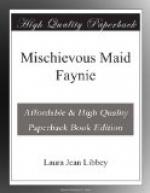And those two weeks changed the whole after current of Claire’s life, as Faynie observed with wonder. It was certainly evident the girl was deeply in love, and Faynie trembled for her, for love would bring to such natures as hers the greatest peace or the bitterest sorrow.
She wondered if her stepmother saw how affairs were drifting.
If it had not been that she and her stepmother were always at cross-purposes with each other, she would have gone to her and warned her that it was dangerous to throw this handsome young man so often into Claire’s society, unless she could readily see that he was pleased with the girl—realizing that poor Claire had a sad drawback in her lameness and that many would seek her society because she was bright and witty, who would never dream of asking her hand in marriage because of it.
Once she attempted to warn Claire of the hidden rocks that lay in love’s ocean, but the girl turned quickly a white, pained face toward her.
“Say no more, Faynie,” she cried; “the mischief, as you call it, has already been done. My heart has left me and gone to him. If I do not win him I shall die. You know the words:
“Some hold that love
is a foolish thing,
A thing of little
worth;
But little or great, or weak
or strong.
’Tis love
that rules the earth.
“The tale is new, yet
ever told;
It has often been
breathed ere now—–
’There was a lad who
loved a lass’—
’Tis old
as the world, I trow!
“The song I sing has
been sung before,
And will often
again be sung
While lads and lasses have
lips to kiss,
Or bard a tuneful
tongue.
“And this is the burden
of my rhyme—
Though love be
of little worth,
Yet from pole to pole and
shore to shore,
’Tis love
that rules the earth.”
“And it is love that breaks hearts and wrecks lives,” murmured Faynie, with streaming eyes and quivering lips. “Oh, Claire! again I warn you to take care—beware!”
For one brief moment she was tempted to tell Claire her own story.
Ah, had she but done so, how much misery might have been spared the hapless girl! But she put the impulse from her with a shudder.
No, no, she could not breathe to human ears the story of her false lover and the tragedy that had ended her dream of love.
She had never permitted her thoughts to dwell upon Lester Armstrong since that fatal night.
If there were times when she thought of him as when she knew him first, seemingly so loving, tender and true, she put the thought quickly from her, remembering him as she saw him that fatal night—transformed suddenly into a demon by strong drink, when he struck her down upon finding that she had just been disinherited—that she was not the heiress that he had taken her to be.
He thought his crime buried fathoms deep under the drifting snow heaps. Ah, how great would be his terror to find that the grave to which he had consigned her had given her back to the world of the living! No, no, she could not shock Claire’s young ears with that horrible story!




